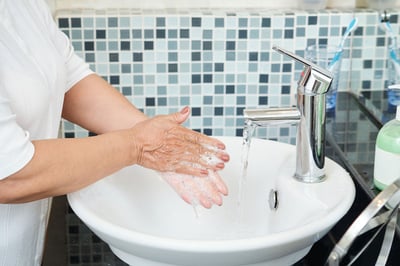 When winter comes, the gastrointestinal infection called “norovirus” threatens the health of our senior loved ones.
When winter comes, the gastrointestinal infection called “norovirus” threatens the health of our senior loved ones.
Most media mentions of norovirus in seniors involve rapidly spreading outbreaks on cruise ships. But these accounts obscure the fact that norovirus is a danger for seniors in other settings too.
What do caregivers need to know to keep themselves and their loved ones safe from this nasty bug?
What Is Norovirus?
Norovirus is sometimes called “food poisoning,” “stomach flu,” or “stomach bug.” It is the leading cause of foodborne illness and can be caused by other germs and chemicals. Even though it is sometimes called a flu, it is not caused by the influenza virus.
According to the Centers for Disease Control and Prevention (CDC), two recent norovirus outbreaks have been linked to oysters, both raw and frozen.
Common symptoms are vomiting, diarrhea, nausea, abdominal cramping, and stomach pain. Some people experience headaches, fever, fatigue, or weakness. The symptoms can come on suddenly and last for one to three days. But norovirus can spread before people become symptomatic and for up to three days afterward.
Up to 30% of people infected with norovirus do not develop any symptoms at all, which can make it difficult to detect and contain an outbreak. But for the rest, norovirus is extremely unpleasant and can involve several days of alternating between the bed and the bathroom.
For seniors, however, norovirus can cause dehydration and become much more serious—or even deadly.
How Common Is Norovirus?
Each year, norovirus affects more than 23 million people, and it causes as many as 71,000 hospitalizations and 800 deaths in the United States. Outbreaks tend to occur in crowded spaces like hospitals, cruise ships, and nursing homes.
How Do You Get Norovirus?
Norovirus is very contagious. You get it from:
- Direct contact with an infected person
- Eating contaminated food
- Drinking contaminated water
- Touching contaminated surfaces and putting unwashed hands in your mouth
Norovirus Prevention
The CDC recommends the following precautions to protect yourself and others from norovirus.
- Wash hands often, especially after using the bathroom or eating.
- Rinse fruits and vegetables.
- Cook all foods, and especially shellfish, thoroughly.
- Stay home when you are sick and for two days after symptoms end.
- Avoid preparing food for others when you are sick and for two days after the symptoms stop.
- Clean and disinfect contaminated surfaces with a bleach-based cleaner during an outbreak.
- Maintain good hygiene and use alcohol-based sanitizer.
Treating Norovirus
Even if you take all the precautions, norovirus outbreaks can and do happen. Because it is a virus, norovirus can’t be treated with antibiotics. But some norovirus survival techniques can help seniors stay comfortable while avoiding norovirus-related complications.
If your loved one contracts norovirus, you can help them by:
- Making sure they get plenty of rest.
- Helping them stay hydrated due to the loss of fluids. Some doctors recommend sports drinks or other over-the-counter remedies for replenishing critical nutrients and minerals.
- Watching for signs of dehydration: dry mouth and throat, decreased urination, and dizziness. If you notice any of these signs, call your doctor—hospitalization and intravenous fluids may be needed.
- Encouraging them to wash their hands often.
Surviving Norovirus
In this mmlearn video, “Surviving Norovirus: Not Just a Cruise Ship Issue,” Maria Wellisch, RN, LFNA, emphasizes the importance of learning how to recognize and treat potential outbreaks of this dangerous illness.
“If you think it just happens on cruise ships, we are going to learn about how prevalent norovirus is,” says Wellisch. “When I see 800 deaths from this virus, I think this is a very important thing for us to talk about. This isn’t just cruise ships; it’s schools, nursing homes, assisted living facilities, restaurants. It’s something that all of us need to know about.”
Wherever people live together in communal settings, where they are all touching items and spending time in common areas, there is a risk for the spread of norovirus.
Whether your loved one is aging in place or living in a residential facility, caregivers can help by learning how to keep seniors safe from this unpleasant—and often dangerous—illness.

